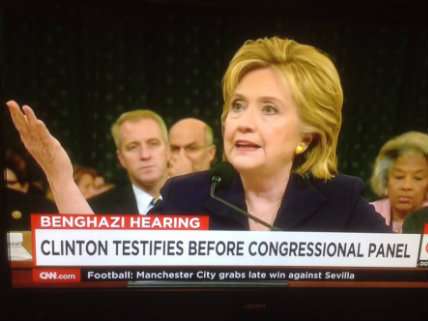Benghazi Circus Was Born in Hillary's Watergate Past
The Benghazi hearings amount to a kind of poetic justice.

The Republican Congress has not repealed ObamaCare. It hasn't cut taxes or simplified them. It hasn't reformed immigration law. And it hasn't managed to prevent President Obama's deal to lift the nuclear sanctions that had been imposed on Iran. It did, however, manage to haul before it a leading Democratic candidate for president, Hillary Clinton, and subject her to 11 hours of questioning about her email and the deaths, in an attack that began on September 11, 2012, of four Americans at Benghazi, Libya.
In one sense, Clintons' career was coming full circle to where it began more than 40 years ago, in 1974, when Hillary Rodham, as she was then known—a newly minted graduate of Yale Law School—joined the staff of the House Judiciary Committee that was preparing to impeach Richard Nixon for Watergate. The collection of lawyers employed by Peter Rodino, a Democrat from New Jersey—William Weld, who became a Republican governor of Massachusetts; Bernard Nussbaum, who became White House counsel to President Bill Clinton; Robert Sack and Pierre Leval, who both eventually served on the U.S. Court of Appeals for the Second Circuit; and John Doar, a hero of the legal fight against segregation—may have been the greatest assembly of legal talent since Daniel Webster dined alone.
Nixon's resignation in response to that onslaught by a Congress controlled by an opposing party provided a precedent so dramatic that succeeding Congresses were tempted to attempt to repeat it, regardless of whether the crimes of the presidents who followed came anywhere near Nixon's. Thus, Reagan was subjected to the Iran-Contra hearings. Bill Clinton endured the Whitewater investigations of Rep. Dan Burton and Senator Alfonse D'Amato. And President Obama's secretary of state, Hillary Clinton, who back in Nixon's day was a congressional lawyer-investigator herself, now finds herself on the receiving end of congressional inquiries.
That's not the only sense in which the Benghazi hearings amount to a kind of poetic justice. Some Democrats—and Donald Trump—blame George W. Bush, rather than the Islamist terrorists, for the deaths on September 11, 2001. It's just as illogical to blame Clinton—rather than the Islamist terrorists—for the deaths at Benghazi.
Just because both sides do it doesn't make it right. Not for nothing did Rep. Kevin McCarthy find himself out of the running for Speaker of the House immediately after committing the gaffe of boasting about the effect the Benghazi committee has had in driving down Hillary Clinton's poll numbers.
The best substantive defense of the Benghazi hearings that I have seen was by Elliott Abrams, who was writing on the web site of the Council on Foreign Relations. Abrams served in the State Department and at the National Security Council during the Reagan and George W. Bush administrations and also on the staffs of Democratic Senators Henry "Scoop" Jackson and Daniel Patrick Moynihan (he was pardoned by George H.W. Bush after a misdemeanor guilty plea related to Iran-Contra). Abrams focuses on the failure of requests for additional security from the American ambassador in Libya, Chris Stevens, to reach Clinton. "She was exchanging emails on Libya with Sidney Blumenthal—but not with Chris Stevens," Abrams writes. "Putting politics aside that is a bureaucratic failure, an indictment of the management and information system she established in the Department."
Maybe so. Yet the Republican Party's management of its legislative business and leadership succession in Congress isn't exactly a shining case study in deftness, either.
It's no wonder that after all these years of blame-casting, gotcha politics, recrimination, and the attempted criminalization of policy differences, voters are looking to fresh faces without a lot of Washington experience. What is the prize for a Ben Carson or a Donald Trump or a Marco Rubio who wins the presidency? Being the next to reap the bitter harvest planted by young Hillary Rodham and her colleagues on the Watergate Committee so long ago.


Show Comments (8)